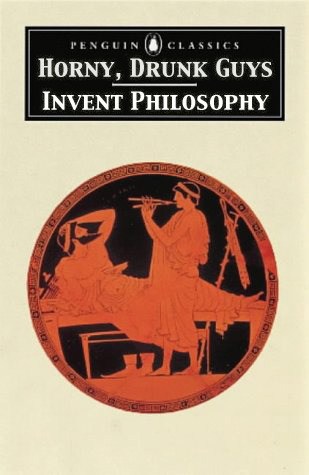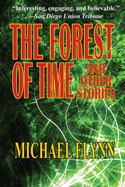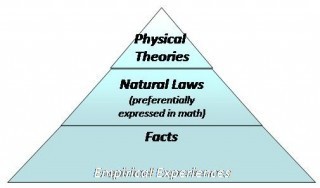Michael Flynn's Blog, page 60
December 13, 2010
Odds and Ends
Our ever-vigilant Congress has come down hard on that great vexing issue of our times: TV ads that are louder than the programs they pay for. Yes, we're talking about the Commercial Advertising Loudness Mitigation Act , or CALM Act. (The Honorable Members invest a great deal of effort in devising apposite acronymable titles for their Acts.) Sponsoring Rep. the Hon. Anna Eshoo (Gesundheit, D-CA) announced, "Consumers have been asking for a solution to this problem for decades, and today they finally have it." For decades? There is no stopping the blitzkrieg of the congressional juggernaut. "[The bill] gives consumers peace of mind, because it puts them in control of the sound in their homes." Anyone with small children at home realizes how elusive that control is.
Of course, all this is after pretty much everybody has a TiVo or a DVR and hence the ability to skip commercials entirely.
Next up: "The pressing problems of junk faxes..."
(h/t: WSJ Best of the Web)
+ + +
Don't Listen to Them; Listen to Them!
"The documents appear to have been acquired illegally and contain all manner of private information and statements that were never intended for the public eye, so they won't be posted here."--New York Times, on the Climategate emails, Nov. 20, 2009 "The articles published today and in coming days are based on thousands of United States embassy cables, the daily reports from the field intended for the eyes of senior policy makers in Washington. . . . The Times believes that the documents serve an important public interest, illuminating the goals, successes, compromises and frustrations of American diplomacy in a way that other accounts cannot match."--New York Times, on the WikiLeaks documents, Nov. 29, 2010
+ + +
...and Weaving!
UN Executive Invokes Mayan Goddess At Cancun Global Warming Summit (headline)
With United Nations climate negotiators facing an uphill battle to advance their goal of reducing emissions linked to global warming, it’s no surprise that the woman steering the talks appealed to a Mayan goddess Monday.
Christiana Figueres, executive secretary of the U.N. Framework Convention on Climate Change, invoked the ancient jaguar goddess Ixchel in her opening statement to delegates gathered in Cancun, Mexico, noting that Ixchel was not only goddess of the moon, but also “the goddess of reason, creativity and weaving.
No surprise, indeed. We all invoke Mayan goddesses when we face uphill battles to advance our goals. We're sure Sisyphus did. We're impressed with Ixchel's resume: not only reason, but creativity, the opposite of reason. This in addition to taking care of the Moon, and of course weaving. Eclectic comes to mind. We only have slight reservations: if we do not advance these Ixchel-endorsed goals, we the advocates rip our still-beating heats from out our rib cage?
+ + +
New Titles for Old Books
Many of the titles on Better Book Titles site are simply editorializing on the book or summarizing its plot, but this one for the Odyssey actually kicks. Come to think of it, it works for the Iliad (Helen) as well as the Odyssey (Penelope). Of course, then there is Plato's Symposium, too. The title might hook a few more readers. OTOH, IMHO, the retitling of Shelly's Frankenstein just misses, while Hamlet becomes more enticing.





The last one there is for The God Delusion and segues nicely into:
+ + +
Shrinks Toss Narcs Off the Bus
The Times reported that "the fifth edition of the Diagnostic and Statistical Manual of Mental Disorders (due out in 2013, and known as DSM-5) has eliminated five of the 10 personality disorders that are listed in the current edition":
Narcissistic personality disorder is the most well-known of the five. . . .
The central requirement for N.P.D. is a special kind of self-absorption: a grandiose sense of self, a serious miscalculation of one's abilities and potential that is often accompanied by fantasies of greatness. . . .
The second requirement for N.P.D.: since the narcissist is so convinced of his high station (most are men), he automatically expects that others will recognize his superior qualities and will tell him so. . . .
Finally, the narcissist, who longs for the approval and admiration of others, is often clueless about how things look from someone else's perspective. Narcissists are very sensitive to being overlooked or slighted in the smallest fashion, but they often fail to recognize when they are doing it to others.
Most of us would agree that this is an easily recognizable profile, and it is a puzzle why the manual's committee on personality disorders has decided to throw N.P.D. off the bus.
Why would the shrinks drop this diagnosis at this point in history? 'Tis a mystery; but strangely, it all works out in the end.
And, as a benefit, with the dropping of 5 out of 10 personality disorders, the entire country has become in one swoop 50% saner.
December 12, 2010
words of wisdom
If you never feel stupid, you're an idiot. -- Brandon Watson
December 11, 2010
The Wildest Dreams of Kew
Here's a good candidate. Pretty eerie-looking critter. And what are those balls atop its thorax for?

And yes, it's the real mccoy:

But the site Why Evolution is True rather spoils things by resorting to the veriest "just so" stories rather than pursue the route of the Old Physicists: abstracting from sensory impressions (quiae) to a rational principle (propter hoc) and then deducing consequences from that principle and falsifying alternative principles to establish a physical cause. We live in the publish/perish age of Jumping To Conclusions. Gotta rack up them pubs!
The alternative is the modern Pythagorean approach of creating a mathematical model and forgetting about physical causes. But evolution is not math-friendly. There are no Darwin Equations.
In either case, hand-waving is not science.
A first guess is that it’s a sexually-selected trait, but those are often limited to males, and these creatures (and the ones below) show the ornaments in both sexes. Kemp hypothesizes—and this seems quite reasonable—that “the hollow globes, like the remarkable excrescences exhibited by other treehoppers, probably deter predators.” It would be hard to grab, much less chow down on, a beast with all those spines and excrescences.
Note, though, that the ornament sports many bristles. If these are sensory bristles, and not just deterrents to predation or irritating spines, then the ornament may have an unknown tactile function.
But notice how difficult it is to talk about evolution without talking in teleological terms. The structure is "for" something: sexual attraction (hubba hubba), or predatorial deterrence, or sensation, or something.Of course, this was the very thing that led the atheist philosopher Jerry Fodor to rip natural selection apart as too theological.
The On-going Crisis
And who better than The Man from Hope? Yet there is something ineffably sad about this scene. The president, hopelessly out of his pay grade, calls upon the Pro from Dover, who delivers as always. And then, in media res, simply wanders off because he has, well, other things to do. Everything may be factual. He may very well have had other things to do. But there is an odd tone-deafness to the imagery in this, the post-modern Age of Image. Visually, he seems to announce his own irrelevance. This is not what his supporters thought they were electing; and in a way it is not what his opponents thought they were resisting, either.


(h/t The Anchoress; Instapundit)
Give us Reagan or give us Nixon! Give us FDR or give us LBJ! Our presidents should succeed greatly or fail gloriously. Give us Jesus or give us Barabbas! But don't give us the smoke.
The Mask, Slipping
December 8, 2010
Headline of the Day
"Three Suicides in Peoria in 24 Hours Prompts [sic] Police to Remind Residents Not to Kill Themselves"
--headline, Phoenix New Times website, Dec. 7
Irony of the Week Award
"It was 54 deg. F in Cancun this morning — a record low for the date."
http://www.drroyspencer.com/2010/12/gore-effect-strikes-cancun/
The Gore Effect is in full swing.
Arsenic and Old Lace
http://www.politicsdaily.com/2010/12/04/does-a-new-life-form-mean-god-is-dead/?ncid=webmail
"The polite thing to say is that discoveries such as this don't really impeach the credibility of established religion, but in truth of course they really do," David Niose, president of the American Humanist Association (AHA), a leading secularist organization, said of this week's revelations about the microbes discovered in Lake Mono in California.
"The fact that life can spring forth in this way from nature, taken in context with what else we've learned in recent centuries about space and time, surely makes it less plausible that the human animal is the specially favored creation of all-powerful, all-knowing divinity," Niose said.
Why do people who proclaim the superiority of reason do such a persistently poor job of using it? One expects poor reasoning from Young Earth Creationists, but at least they make no claims to worship at the altar of the cerebral.
"The fact that life can spring forth in this way from nature." Let's see what Tommy Aquinas said.
Species, also, that are new, if any such appear, existed beforehand in various active powers; so that animals, and perhaps even new species of animals, are produced by putrefaction by the power which the stars and elements received at the beginning. Again, animals of new kinds arise occasionally from the connection of individuals belonging to different species, as the mule is the offspring of an ass and a mare; but even these existed previously in their causes, in the works of the six days. Summa theologica, Part I, Q73, art.1, reply obj. 3Now, Tom relied on the science of the day, always risky; but note that he ascribed the emergence of new species (if any) to nature: putrefaction, the stars and elements, cross-breeding. Nowadays, we ascribe such things to, well, the elements, and swapping genetic material, and (as Sagan used to say) "we are all star-stuff." Elsewhere, Tom specifically argues that nature possesses immanent powers of its own. Summa theologica, Part I, Q115, art 2.IOW, it was the teaching of the Church that such things do spring from nature. They simply went on to say that natures had these powers because etc. "that the human animal is the specially favored creation of all-powerful, all-knowing divinity," Not sure how any of it makes this statement less plausible or more plausible. The traditional Christians always considered that God was the source of being, not only of "space and time" but of the powers of natures. Discovering a new power of nature would not affect that. But it was never their belief that humans were "specially favored" or that the universe was created for the convenience of humans and so forth. The belief was that the universe was created to show forth God's glory, and that humans were created to "love, honor, and serve God in this world, and be happy with him in the next." Nothing in that about being specially favored; nor any limitations on whether there might be others created for similar purposes elsewhere. But as Augustine was said to have replied when asked if satyrs had souls: "Show me a satyr, and then we'll talk." (He said it in more flowery Latin, however.) Now, About "Tentative, Derivative" Facts
A lot of facts aren't. Not in the sense of direct observation. What the experimenters did was they cultured some of these bacteria and then reduced the phosphate content in the media, replacing it with arsenate. And, lo, the bacteria continued to thrive. From this they inferred that the bacteria were using the arsenic. IOWIf T, then AATherefore, TWhich we all know as the fallacy of asserting the consequent. That is, if the bacteria were incorporating the arsenic in place of the phosphorus, then we might see something like this; but seeing something like this does not mean the bacteria are incorporating the arsenic. There might be other explanations. Like faulty measurements, to name one. This has not escaped the notice of other scientists.
Oh, Well
Scientists see fatal flaws in the NASA study of arsenic-based life
As soon Redfield started to read the paper, she was shocked. "I was outraged at how bad the science was," she told me.
Redfield blogged a scathing attack on Saturday. Over the weekend, a few other scientists took to the Internet as well. Was this merely a case of a few isolated cranks? To find out, I reached out to a dozen experts on Monday. Almost unanimously, they think the NASA scientists have failed to make their case. "It would be really cool if such a bug existed," said San Diego State University's Forest Rohwer, a microbiologist who looks for new species of bacteria and viruses in coral reefs. But, he added, "none of the arguments are very convincing on their own." That was about as positive as the critics could get. "This paper should not have been published," said Shelley Copley of the University of Colorado.
But if "the fact that life can spring forth in this way from nature" makes it "less plausible that the human animal is the specially favored creation of all-powerful, all-knowing divinity," will Mr. Niose now issue a press release proclaiming that "the fact that life did not spring forth in this way from nature, makes it more plausible that the human animal is the specially favored creation of all-powerful, all-knowing divinity"?
Of course not. There is no necessary connection between such mundane facts and the metaphysical conclusion.
I should also mention that the article which quotes Mr. Niose also quotes well known SF fan, Br. Guy Consolmagno SJ, of the Vatican Observatory. Dr. Br. Guy is a scientist, not a humanist.
December 4, 2010
The Forest of Time
 Arc Manor, which has brought out my old collection, The Forest of Time and Other Stories, with some updates and enhancements, offers a story, selection or a book free as an ebook.
Arc Manor, which has brought out my old collection, The Forest of Time and Other Stories, with some updates and enhancements, offers a story, selection or a book free as an ebook. They are offering the title story from the Anthology - "The Forest of Time" - as their free give-away in December.
The story is set in an independent, German-speaking Commonwealth of Pennsylvania, on the brink of war with her neighbors: New York, Wyoming Valley, the Long House, and Virginia. The US never gelled and we have dozens of little quarrelsome principalities at about pre-WW1 level technology. Machine guns but no airships or radio. Into this mess steps Hernando Kelly, a cross-time traveler from our world-line, and in him Chief Scout Rudi Knecht, the Hexmajor, and Festungskommodant Vondervogel take keen interest. Is he a spy for the yankees in Wilkes-Barre? A madman? Or exactly what he claims to be?
http://www.graspingforthewind.com/2010/12/02/free-ebook-the-forest-of-time-by-michael-flynn/
http://www.sfsignal.com/archives/2010/12/free-ebook-the-forest-of-time-by-michael-flynn/
The coupon code is 9992374 and instructions and links are at our catalogue at
http://www.PPickings.com
Feel free to publicize this as you will.
December 3, 2010
Booking
Mailed a bunch of books off to a blogfriend, then strolled across the street to a little used book store I patronize. Browsed a bit and fortuitously encountered A.C.Crombie's Medieval and Early Modern Science. It's vol. ii, but that's the fun centuries: XIII - XVII cent. Except for that Black Death thingie. Then, a couple bookcases later, John Lukacs' Outgrowing Democracy, in which he describes the collapse of the American Republic: The Degeneration of Popular Democracy to a Publicity Contest. The Passage from a Democratic Order to a Bureaucratic State.
I asked the proprietor, an elderly fellow - i.e., older than me - if he could secure some particular books for me. It's worth a few bucks to me not to have to hunt around. I've been looking for W. Edwards Deming's The Statistical Adjustment of Data , because I have become interested in how the climate scientists adjust the raw data they harvest from the surface stations. My impression is that there are no statisticians on "The Team." To my surprise, the proprietor knew of Deming. It turns out his father had been good friends with W.Ed back in the 1930s. The number of intermediate acquaintances is always smaller than people suppose. I also asked for another Lukacs book: The Passing of the Modern Age , which I had read years ago in a library copy. I wanted this to inform an article I'm trying to write on the end of the Modern Ages.
Meanwhile, finishing up Harry Turtledove's deCampian novel, Owls to Athens, and still going back to Huizinga's The Autumn of the Middle Ages, which requires slower reading, as well as Gilson's tome on Thomistic philosophy, ditto.
All this made possible by the sending unto Tor of the ms for In the Lion's Mouth , after a second pass by yr. obt. svt. that left 8000 words of immortal prose writhing in the blood and sand.
The Evolution Wars
Another message board had the following exchange:
A: So much of what is taught in school is still technically "Theory" even as it is being taught as fact - like The Big Bang, for instance.
B: The statement quoted above mostly just signals a rather low level of scientific literacy--a lack of awareness of how the words "fact" and "theory" are typically used in science and how that usage differs from the vernacular.
Now my own peculiar experience is that many folks who make the latter point understand the difference no better than those who make the former. This includes scientists, who frequently make very poor philosophers. (The distinction between theory and fact is a philosophical one, not a scientific one. Neither theories nor facts are physical bodies measurable by science.) There are those who suggest, for example, that a theory that has been verified a great many times becomes a fact. This is a little like saying that a baseball team that wins a great many games becomes a base hit.
The Layer Cake of Science
 The distinction between Fact, Law, and Theory was laid out by the logical positivists of yore. These were philosophers of science like Poincare, Mach, Duhem, and Einstein that P.Z.Meyers once derided as running alongside the mighty Locomotive of Science, hollering advice and observations to the likes of the puissant Baconian engineer P.Z.Meyers.
The distinction between Fact, Law, and Theory was laid out by the logical positivists of yore. These were philosophers of science like Poincare, Mach, Duhem, and Einstein that P.Z.Meyers once derided as running alongside the mighty Locomotive of Science, hollering advice and observations to the likes of the puissant Baconian engineer P.Z.Meyers. Start from the bottom, at which we find Empirical Experiences. Things that we see, hear, feel, etc. Both science and philosophy start here, but move in different directions. The scientific direction runs thusly:
1. Facts. When these experiences can be operationally measured, they become facts. Factum est being the participle of "to make," a fact is "something made," a "feat." Measurement creates facts because the same thing measured in two different ways will often produce two different results. The experiment is the premier fact-producing machine, but facts may also be made by meticulously described qualitative observations, such as those Darwin made. (The distinction is oft expressed as between "active" and "passive" statistics.)
2. Laws. Regularities or patterns in the facts are called laws, especially when they can be expressed in mathematical terms. But they can also be expressed verbally. Newton originally did so. The equations associated with his three laws came later - and don't quite correspond to the three laws as he actually stated them. There is no math at all in Darwin, but he did enunciate some laws or principles of evolution.
3. Physical Theories. These are stories or narratives in the context of which a specified body of facts "makes sense." Newton's theory of gravitation "made sense" of Kepler's astronomical observations and mathematical laws. Given a physical theory, the natural laws may be deduced and the facts predicted. When facts are predicted beyond those originally used to develop the theory and then are subsequently found, the theory is further supported. But no amount of support will change a theory into a fact, as such.
The Third Wave positivists regarded theories as neither true nor false, but only useful.
As an illustration, consider the following:
1. Facts: the motions ("falling") of heavy bodies
2. Laws: s=0.5gt^2, F=ma, F=G(M*m)/d^2, etc.
3. Theory: "gravity". Newton's spooky action-at-a-distance (a force field put out by the mass which attracts other masses); superseded by Einstein's warpage of the field of Ricci tensors defining space, so that bodies travel down the geodesics thus created.
No amount of confirmations will establish "gravity" as a fact. Only the actual physical motions of material bodies are facts. "Gravity" remains simply a useful story that "makes sense" of the local motions of bodies under a very wide range of circumstances. When you look at it closely, it is tautological. Why do bodies move in such a fashion? Gravity. How do we know there is gravity? Because bodies move in such a fashion.
Facts are effects, observation of concrete singulars grasped by the senses. Theories are principles, universals grasped by the intellect. Universals - or Natures - do not have material existence, which is why materialists (who typically deny the existence of natures or essences) grow very confused and often treat theories as if they were facts.
Conspiracy Theories, or
Covering Your A Posteriori
[image error]Induction is a fallacy in formal logic; but science is not formal logic. Propositions never stand in isolation and are never divorced from the material world. If we see a strange baseball on the carpet of the dining room, broken glass in the window (likewise on the carpet), and in the distance fleeing young boys with gloves and bats, it is a formal logical fallacy to conclude that they have thrown or hit the baseball through the window. But it is also what Aristotle called a demonstration, in the Posterior Analytics.
Thus, the explanation (theory) does not come from nowhere, but is abstracted from the facts. However, too many Later Moderns stop with a demonstration, which I think is why Popper was able to reduce science from "certain knowledge" (science) to "probable knowledge" (opinion).
But Grosseteste, Zabarella, Lorinus, and Vallius [from the latter of whom Galileo carefully copied his Tractatione de demonstratione] did not stop with the a postiori demonstration, but proceeded to an intermediate stage: "the work of the intellect" in which it is shown that no other explanation can account for the effects. Then, proceed deductively a priori from the cause back to the effects, now properly understood as effects. In the course of this, additional quia (effects) may be predicted and then diligently sought for additional confirmation.
The conspiracy theorist, we now see, is very good at tying facts together with an all-encompassing explanation, but is not so good at the work of the intellect; that is, at considering other possible explanations for the same facts.
The Evolution of Evolution
So, is evolution a fact or a theory? Yes and no. Yes, if you fall into equivocation on the meaning of the term "evolution." The term originally referred to the "rolling out" of a scroll for reading (and an extension of this physical meaning persists when we say that a marching band performs evolutions on the football field). In biology, it refers to the unrolling of new actual species out of the potentialities of older species. We encounter the idea first in Augustine of Hippo, who reasoned that creation had been instantaneous (since time was created along with everything else) and so whatever arose later must have arisen from the rational powers possessed by existing matter. We encounter the same notion much later in Aquinas, who writes:
Species, also, that are new, if any such appear, existed beforehand in various active powers; so that animals, and perhaps even new species of animals, are produced by putrefaction by the power which the stars and elements received at the beginning.
Species etiam novae, si quae apparent, praeextiterunt in quibusdam activis virtutibus, sicut et animalia ex putrefactione generata producuntur ex virtutibus stellarum et elementorum quas a principio acceperunt, etiam si novae species talium animalium producantur.
The interesting thing is that, even though the science of his day was deficient, he supposed that new species arose by natural causes inherent in what existed before them. (And that these pre-existent causes were implicit in nature from the beginning.) We now understand this as the new species existing potentially in the genome of a prior species, in that this or that mutation might transform one genome into another, as the "viable" word CUT may arise by a mutation of the vowel from the equally viable word CAT. A simplification that will do for now.
Now, it is quite clear that new species or kinds have arisen over time, so evolution is a fact insofar as the term means "change in a species over time." It is actually a "body of facts."
However, science is no more a pile of facts than a house is a pile of stones, as Poincare observed. What is needed is a story that makes sense of these facts. That is, we must make the a posteriori demonstration from the effects to the cause. Darwin and Wallace did so by inductively reasoning; so did Lamarck and others. These are theories of evolution, that is: explanation of the facts of evolution. We can sum this up nicely by saying
"Evolution is a fact; natural selection is a theory."
The Worm in the Apple
But if there is one thing that Late Modern Analytic philosophy has shown is that science is underdetermined. That is, no matter how diligent the "work of the intellect" it is not always possible to eliminate all other possible explanations of the facts. So far, there is no experimental distinction between Einstein's theory of relativity and Milne's kinematic theory of relativity. One may deduce the very same laws and facts from both theories. There are at least three (and iiirc, more) theories of quantum mechanics: the Copenhagen theory, the many-worlds theory, and Cramer's transactional theory. Again, all three theories account for the same facts. It is really only in this sense that "a scientific theory is one that is falsifiable." It is not that in order to be scientific is must be falsifiable. We cannot falsify the sphericity of the moon. There really is no other explanation for the phases of the moon. But perhaps the Afshar experiment falsified the Copenhagen and many-worlds theories in favor of the transactional theory. (Copenhageners and Many Worlders deny this.) In any case, some experiment or new observation might do so.
An oft overlooked statement by ID proponent Michael Behe is that he does not deny that evolution occurs, nor that natural selection accounts for the bulk of it. But he contends that the struggle for existence by the organism and the consequent differential survival of "favored races" does not account for the development of biochemical structures. His notion that this "proves" the existence of God is theologically unsound (see Summa theologica, pt I Q2 art3, fifth way). However, it is entirely
Michael Flynn's Blog
- Michael Flynn's profile
- 237 followers



